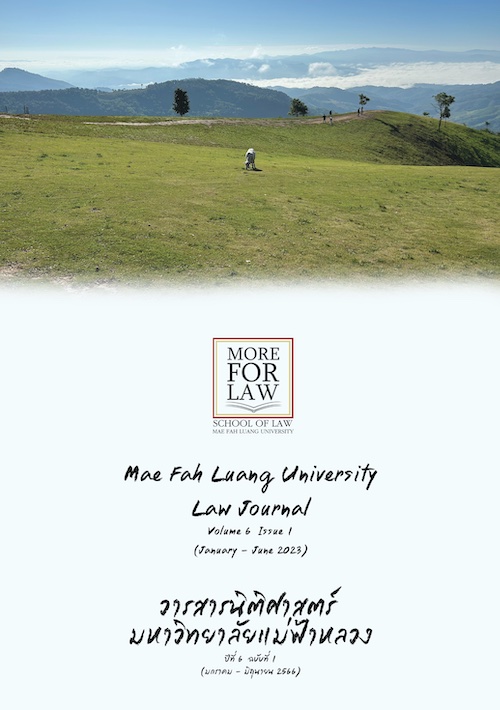Interpretation of Documents
DOI:
https://doi.org/10.14456/mfulj.2023.2Keywords:
Intention of Declaration of Interpretation, Interpretation of Contract DocumentsAbstract
This article aims to study the concept of interpretation of documents under Section 10-14 of the Civil and Commercial Code, which are provisions under the general provision of interpretation of declaration of intention, namely Section 171 to consider the guideline as to how to interpret a juristic act which has a document as a proof, altogether the cases where (i) the true intention of the parties differs from each other or cannot be sought and (ii) the terms appearing in the documents are clear and reflect the intention of the parties. It also studies the cases where there is no document as proof of a juristic act. Moreover, it studies the problems regarding the texts of the provisions in order to seek the spirit of the law and the application of the law by courts. Furthermore, it compares similar provisions in foreign legal systems, namely, English law, French law, as well as international laws, model laws, and model rules, namely, the Common European Sales Law,the Principles of International Commercial Contracts, and the Draft Common Frame of Reference.
It has been found from the study that, according to relevant provisionsregarding the interpretation of documents under the Thai Civil and Commercial Code, it is unnecessary to interpret the document if the terms of the documents are clear, despite the fact that there are still ongoing debates regarding the foregoing issue. In the cases where the terms are unclear because the true intentions of the parties differ from each other or cannot be sought, it is necessary to consider the terms of the documents, which are evidence of the juristic act, to seek the intention of the parties by virtue of Section 171, which provides that the true intention is to be sought rather than the literal meaning of the words or expressions. However, if the true intent or mutual intent of the parties cannot be sought, Sections 10 to 14 will be taken into consideration. According to court’s decisions, there is a guideline of interpretation from the judgement where juristic acts have document as a proof, Besides the relevant provisions to consider, there are other principles that the court applies, namely, surrounding circumstances and interpretation as a whole.
In terms of the relevant principles regarding the interpretation of contracts in foreign laws, international laws, model laws and model rules, it has not yet been found explicit provisions dealing with the interpretation of documents, which is different from the case of Thai law. Nonetheless, it has been found from the study that the studied provisions of the interpretation of contract contain similar rules as Sections 10 to 14 of the Thai Civil and Commercial Code, which could be grouped into 4 categories, namely, (1) Terms to be given effect, (2) Interpretation against the supplier of term, (3) Linguistic discrepancies, and (4) Other relevant rules such as the amount of money is identified in figures or letters, considering surrounding circumstances, and interpreting the document as a whole.
The author has proposed 5 guidelines for the interpretation of documents, which are recommendations to apply and interpret existing provisions under Thai law and to make the concept of interpretation of documents clearer.
Downloads
References
กันย์กัญญา ใจการวงค์สกุล, กฎหมายแพ่ง หลักทั่วไป (Civil Law : General Principles), พิมพ์ครั้งที่ 2(กรุงเทพมหานคร: สำนักพิมพ์วิญญูชน, 2564).
กิตติศักดิ์ ปรกติ, การตีความการแสดงเจตนา, (กรุงเทพมหานคร: เอกสารประกอบการศึกษาวิชากฎหมายลักษณะนิติกรรมสัญญา วิชา น.101, 2562).
กรศุทธิ์ ขอพ่วงกลาง, นิติกรรม สัญญา และคำมั่น, (กรุงเทพมหานคร: โครงการตำราและเอกสารประกอบการสอน คณะนิติศาสตร์ มหาวิทยาลัยธรรมศาสตร์, 2565).
เฉลิมวุฒิ ศรีพรหม, หลักการตีความสัญญา, นิตยสารบทบัณฑิตย์, เล่มที่ 72 ตอนที่ 2 (มิถุนายน 2559).
ไชยยศ เหมะรัชตะ, หลักกฎหมายนิติกรรม-สัญญา, พิมพ์ครั้งที่ 2 (กรุงเทพมหานคร: สำนักพิมพ์นิติธรรม, 2561).
ณรงค์ วิทยไพศาล, หลักการตีความเอกสาร : เกณฑ์วินิจฉัยกฎหมายเพื่อความเป็นธรรมในสังคม / ลอร์ด เดนนิง, (กรุงเทพมหานคร: สำนักพิมพ์อักษรศาสตร์, 2535).
ดาราพร ถิระวัฒน์, กฎหมายสัญญา สถานะใหม่ของสัญญาปัจจุบันและปัญหาข้อสัญญาที่ไม่เป็นธรรม, (กรุงเทพมหานคร: สำนักพิมพ์มหาวิทยาลัยธรรมศาสตร์, 2538).
บุญช่วย วณิกกุล (พระยาเทพวิทุร), คำอธิบายประมวลกฎหมายแพ่งและพาณิชย์ บรรพ 1-2 มาตรา 1-240, (พระนคร: สำนักพิมพ์ไทยพิทยา, 2447-8).
ประกอบ หุตะสิงห์, ประมวลกฎหมายแพ่งและพาณิชย์ว่าด้วยนิติกรรมและสัญญา, (กรุงเทพมหานคร: สำนักพิมพ์นิติบรรณการ, 2517).
ประสิทธิ์ โฆวิไลกูล, กฎหมายแพ่ง : หลักทั่วไป : คำอธิบายประมวลกฎหมายแพ่งและพาณิชย์ มาตรา 4-14, (กรุงเทพมหานคร: สำนักพิมพ์นิติธรรม, 2554).
ปรีดี เกษมทรัพย์, อนุสรณ์งานพระราชทานเพลิงศพรองศาสตราจารย์ ดร.สมศักดิ์ สิงหพันธุ์, (กรุงเทพมหานคร: ม.ป.ท., 2526).
ปรีดี พนมยงค์ (หลวงประดิษฐ์มนูธรรม), บันทึกข้อความสำคัญประกอบด้วยอุทธาหรณ์และคำแนะนำแห่งประมวลกฎหมายแพ่งและพาณิชย์ บรรพ 1, (พระนคร: สำนักพิมพ์นิติสาส์น, 2471).
ภารวีร์ กษิตินนท์, การใช้หลักสุจริตในการตีความสัญญา, (วิทยานิพนธ์ปริญญาโท หลักสูตรนิติศาสตรมหาบัณฑิต คณะนิติศาสตร์ มหาวิทยาลัยธรรมศาสตร์, 2550).
ภิรมย์พร สุดใจ, การตีความพินัยกรรม, (วิทยานิพนธ์ปริญญาโท หลักสูตรนิติศาสตรมหาบัณฑิต คณะนิติศาสตร์ มหาวิทยาลัยธรรมศาสตร์, 2556).
ศนันท์กรณ์ (จำปี) โสตถิพันธุ์, คำอธิบายนิติกรรม-สัญญา, พิมพ์ครั้งที่ 24 (กรุงเทพมหานคร: สำนักพิมพ์วิญญูชน, 2564).
สำนักงานคณะกรรมการกฤษฎีกา, ร่างประมวลกฎหมายแพ่งและพาณิชย์ บรรพ 6 ตอน 1, (กรุงเทพมหานคร: สำนักพิมพ์สำนักงานคณะกรรมการกฤษฎีกา, ม.ป.ป.).
สำนักงานราชบัณฑิตยสภา, พจนานุกรม ฉบับบัณฑิตยสถาน พ.ศ. 2554 [ออนไลน์], แหล่งที่มา: https://dictionary.orst.go.th/
อรุณ ภาณุพงศ์, รวมบทความทางวิชาการเนื่องในโอกาสครบรอบ 84 ปีศาสตราจารย์สัญญา ธรรมศักดิ์, (กรุงเทพมหานคร: มูลนิธินิติศาสตร์ มหาวิทยาลัยธรรมศาสตร์, 2534).
ธนกฤต วรธนัชชากุล และคณะ, ประมวลกฎหมายแพ่งและพาณิชย์ ฉบับอ้างอิง บรรพ 1 หลักทั่วไป, พิมพ์ครั้งที่ 2 (กรุงเทพมหานคร: สำนักพิมพ์วิญญูชน, 2560).
ธานินทร์ กรัยวิเชียร และวิชา มหาคุณ, การตีความกฎหมาย, พิมพ์ครั้งที่ 2 (กรุงเทพมหานคร: สำนักพิมพ์ชวนพิมพ์, 2523).
Ahmet Cemil Yildirim, Interpretation of Contracts in comparative and Uniform law, (The Netherlands: Wolters Kluwer, 2019).
C.H. Beck Hart Nomos, Common European Sales Law (CESL): Commentary, Reiner Schulze ed. (München: Hart Publishing, 2012).
Christian von Bar and Eric Clive, Principles, Definitions and Model Rules of European Private Law, Draft Common Frame of Reference prepared by the Study Group on a European Civil Code and the Research Group on EC Private Law (Acquis Group), (New York: Oxford University Press, 2010).
Kim Lewison, The Interpretation of Contracts, (London: Sweet & Maxwell, 1989).
Sir William R. Anson, Principles of the English Law of Contract and of Agency in its relation to contract, (Clarendon Press, 1959).
Elias E. Savollos, Galvin and Richard F., Reasoning and the Law: The Elements, (Belmont, Calif.: Wadsaorth, 2001).
สำนักงานราชบัณฑิตยสภา, พจนานุกรม ฉบับบัณฑิตยสถาน พ.ศ. 2554 [ออนไลน์], แหล่งที่มา: https://dictionary.orst.go.th/
Luigi BERLINGUER and Klaus-Heiner LEHNE, COMMON EUROPEAN SALES LAW (CESL) [Online], Source: https://www.europarl.europa.eu/legislative-train/theme-connected-digital-single-market/file-common-european-sales-law/
Downloads
Published
How to Cite
Issue
Section
License
Copyright (c) 2023 Mae Fah Luang University Law Journal

This work is licensed under a Creative Commons Attribution-NonCommercial-NoDerivatives 4.0 International License.






